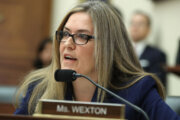NASSER KARIMI
Associated Press
TEHRAN, Iran (AP) — Thousands of Iranians chanted “Down with America” on Tuesday in rallies marking the anniversary of the 1979 takeover of U.S. Embassy in Tehran. But the annual show of America-bashing by Iran’s hard-liners seemed to bring little public enthusiasm amid the push by moderate President Hassan Rouhani for a nuclear agreement with Washington.
More than 10,000 people joined the anniversary rally outside the former embassy compound in the capital. That was thousands less than the last year’s rally, the first since Rouhani’s election, when his hard-line rivals sought to make a resounding show of opposition to any concessions to the United States.
Rouhani has made the negotiations the centerpiece of his administration, betting that he can secure a deal that would lift international sanctions and end Iran’s isolation. That has been a major hope among many Iranians, who are looking for a boost to the ailing economy. The U.S. and its allies say the accord must ensure that Iran cannot use its nuclear program to build a weapon.
U.S. Secretary of State John Kerry and Iranian Foreign Minister Mohammad Javad Zarif are to hold key talks on the nuclear program next week in Oman’s capital Muscat, where they will be joined by the European Union’s foreign policy chief, Catherine Ashton.
The embassy anniversary this year coincided with Ashoura, a Shiite holy day commemorating the 7th century martyrdom of Imam Hussein, a grandson of the Prophet Muhammad revered by Shiites who was killed in a battle with rival Muslims.
The coincidence may have diminished turnout for the embassy rally, since millions around the country were more focused on Ashoura religious rites. Also, schools were out, meaning hard-liner organizers of the embassy protest could not bus in students as they have in past years to fill out numbers.
Still, hard-liners sought to use both Ashoura and the anniversary to draw a line against any concessions to the United States. In recent days, posters appeared in the streets of Tehran denouncing the U.S. government as the “Shimr of this age.” Shimr was the fighter who killed Imam Hussein in the Battle of Karbala.
Tuesday’s crowd outside the former embassy burned U.S., Israeli and British flags as they chanted against all three countries.
The main speaker at the rally, cleric and university professor Ali Reza Panahian, compared the U.S. to Hussein’s enemies — the forces of the Ummayad sultan Yazid, which surrounded Hussein and his loyalists and crushed them in Karbala, in present day Iraq.
“Today, the evil arrogant powers have learned that they should encircle believers of the region and behead them in the same way that the enemies of Hussein encircled him,” Panahian said. He vowed that the negotiations will never change Iran’s anti-U.S. stance, saying the Iranian people seek the “toppling of the global arrogance” — the term used by hardliners for the U.S.
Also at the rally, the head of the Basij organization, paramilitary wing of the powerful Revolutionary Guards, said the negotiations are intended only to reveal American intentions to oppress Iran.
“Iran will never go through the path of concessions,” Mohammad Reza Naghdi told reporters.
The negotiators have a Nov. 24 deadline to seal the final deal, though they could mutually decide to extend the talks. The West suspects Iran’s nuclear program is aimed at producing atomic weapons, a charge Tehran denies, insisting it’s for peaceful purposes only.
Supreme Leader Ayatollah Ali Khamenei, who has final say on all Iranian state matters, has repeatedly backed the talks even though he has expressed doubts about the intentions of the six-member group — the five permanent U.N. Security Council members and Germany — in the negotiations.
In contrast to the anti-U.S. rhetoric in Tuesday’s rallies, an adviser of Zarif said Iran-U.S. relations have changed from being openly hostile to friendly. But “it’s a friendly relationship not based on trust, not yet,” Ali Khorram said in comments reported in newspapers Sunday.
He said the two countries have “common fields of cooperation in Iraq and Syria” against Islamic State extremists.
Copyright 2014 The Associated Press. All rights reserved. This material may not be published, broadcast, rewritten or redistributed.







